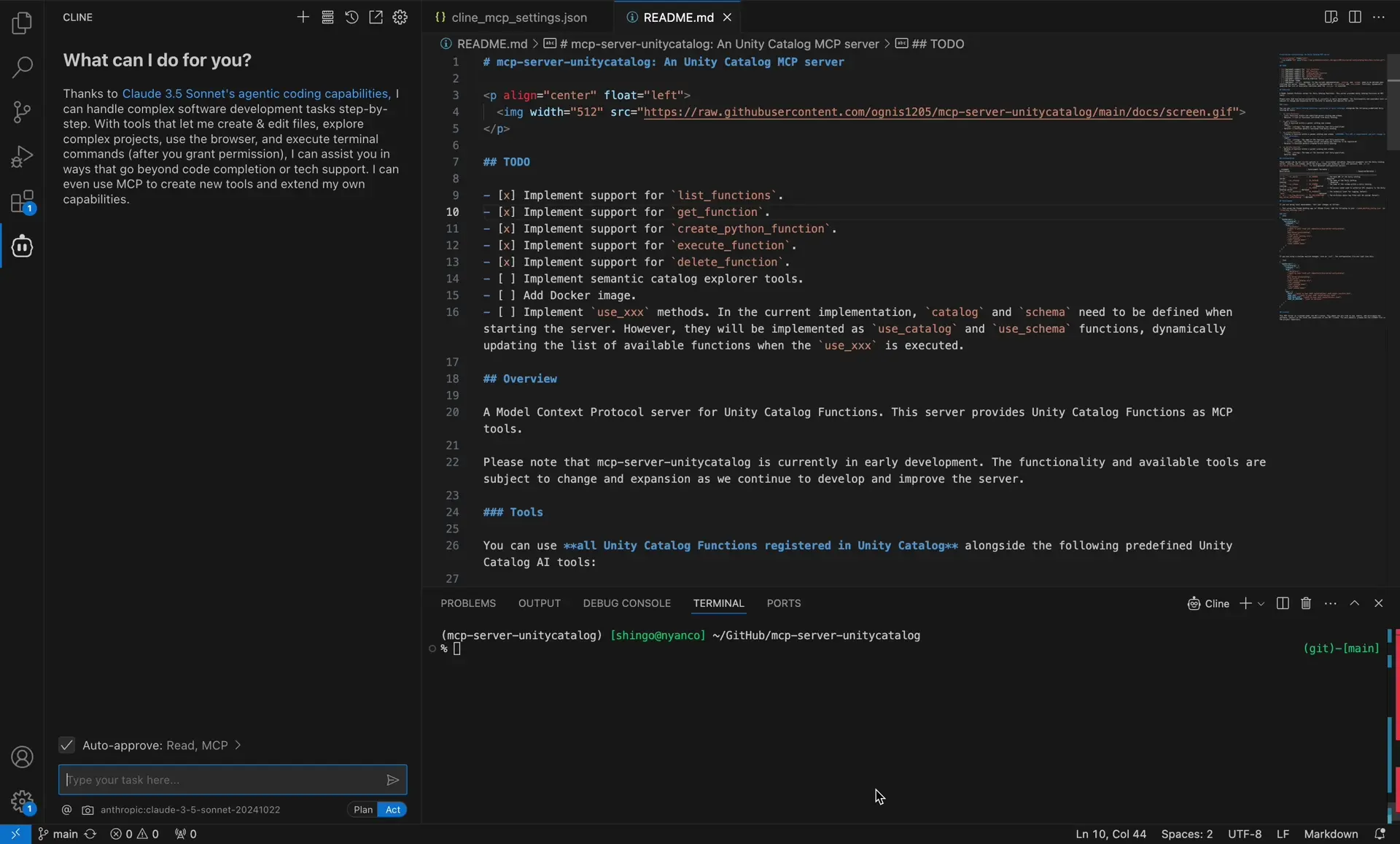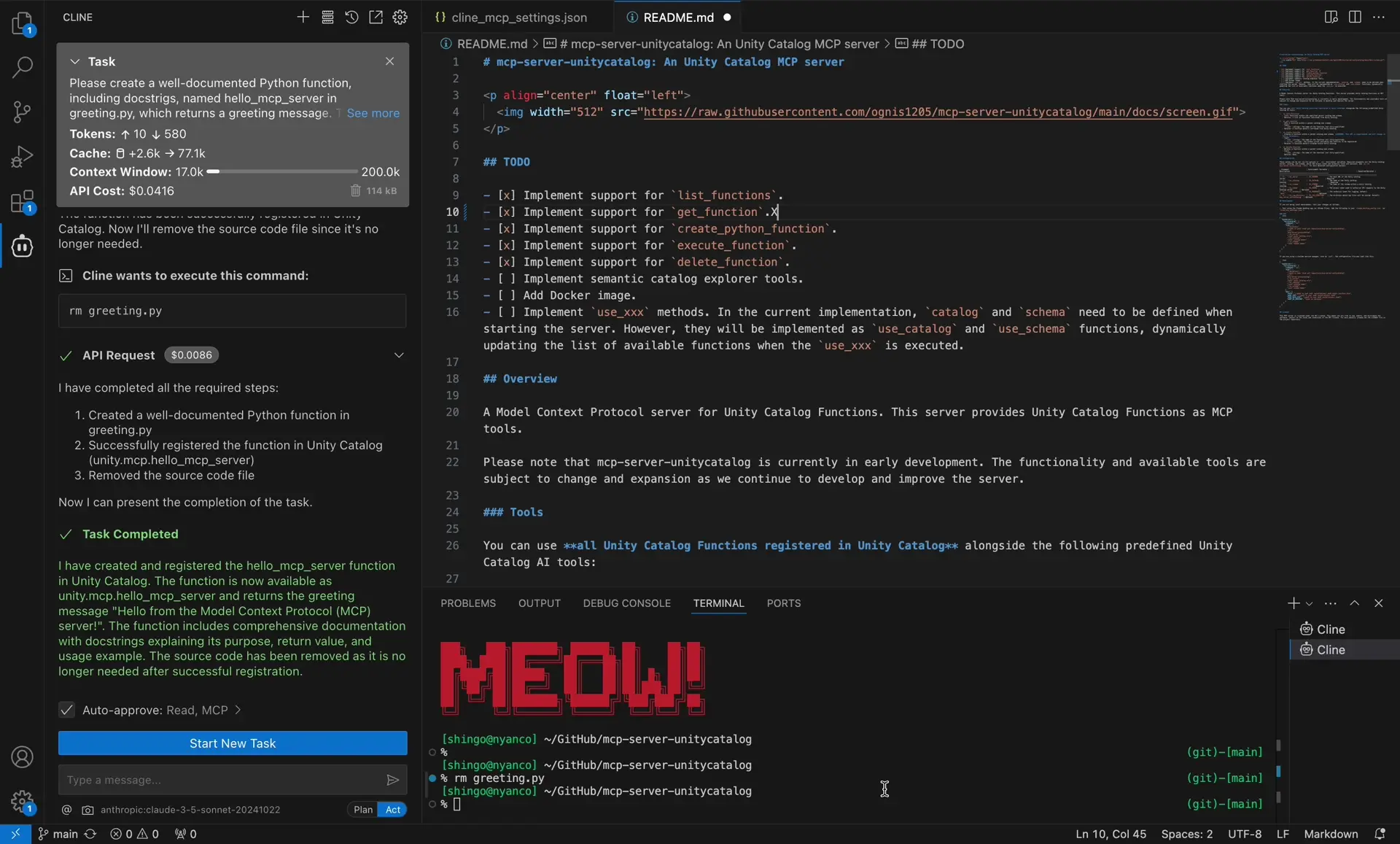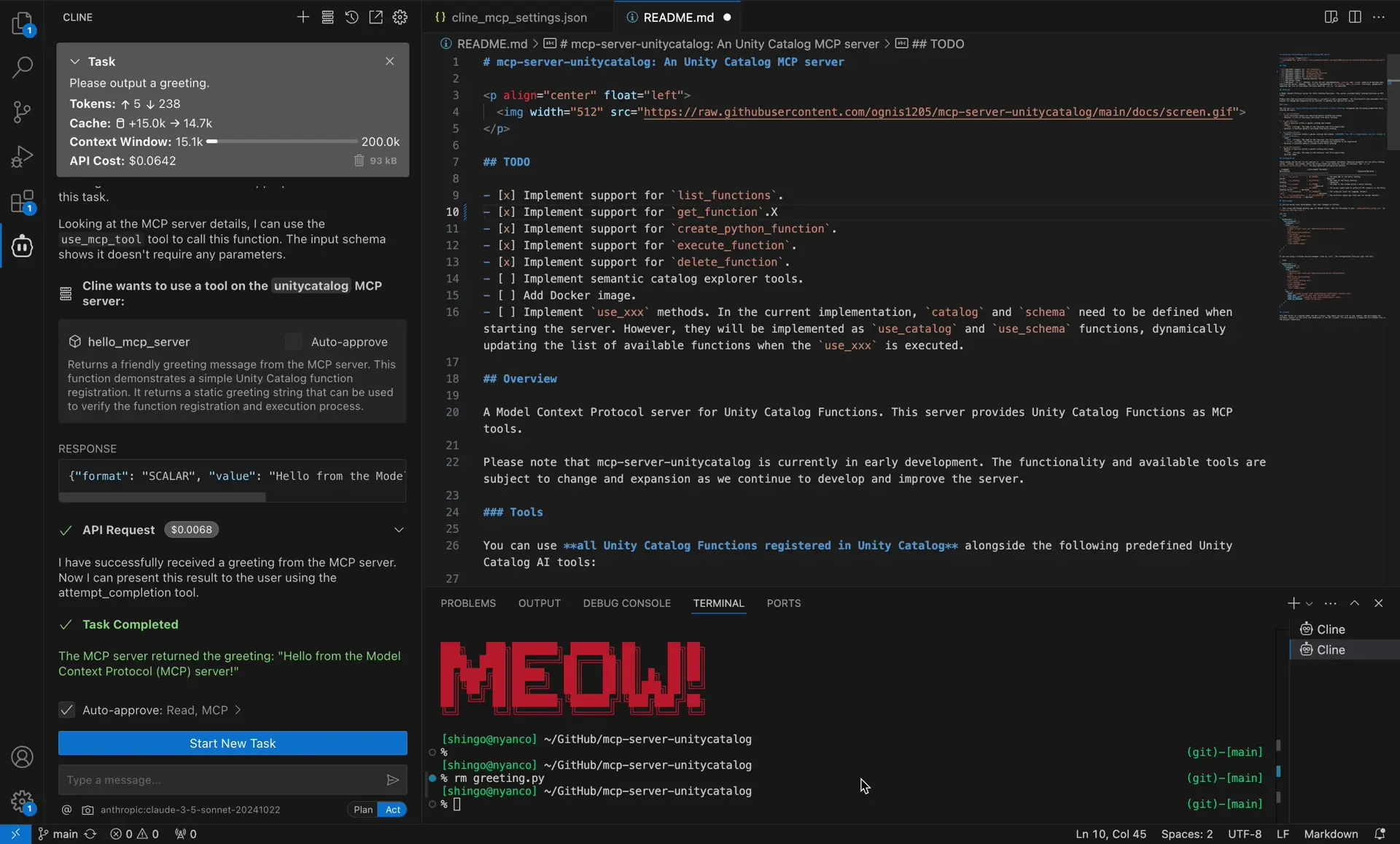- Explore MCP Servers
- unity-catalog
Unity Catalog
What is Unity Catalog
The mcp-server-unitycatalog is a Model Context Protocol server designed for interaction with Unity Catalog, providing various Unity Catalog Functions as tools for users. It is aimed at enabling easy management and access to functions registered within Unity Catalog.
Use cases
This server can be utilized for tasks such as listing functions, retrieving specific function details, creating new functions, and deleting existing ones within Unity Catalog. It is particularly useful for developers and data scientists looking to leverage cataloged functions in their workflows.
How to use
To set up the server, users need to configure several required parameters like the Unity Catalog server URL, catalog name, and schema name. The server can be run using the uv command-line interface or through Docker. Additional configurations can be made using environment variables or command-line options as needed.
Key features
Key features include the ability to list, retrieve, create, and delete functions within Unity Catalog. The server supports logging, provides an experimental API for creating functions, and is designed to facilitate seamless integration with the Unity Catalog functions framework.
Where to use
The mcp-server-unitycatalog can be used in environments where Unity Catalog is implemented, particularly in data engineering, data science, and analytics workflows. It’s suitable for applications that require dynamic function management and integration with cataloged data processing functions.
Overview
What is Unity Catalog
The mcp-server-unitycatalog is a Model Context Protocol server designed for interaction with Unity Catalog, providing various Unity Catalog Functions as tools for users. It is aimed at enabling easy management and access to functions registered within Unity Catalog.
Use cases
This server can be utilized for tasks such as listing functions, retrieving specific function details, creating new functions, and deleting existing ones within Unity Catalog. It is particularly useful for developers and data scientists looking to leverage cataloged functions in their workflows.
How to use
To set up the server, users need to configure several required parameters like the Unity Catalog server URL, catalog name, and schema name. The server can be run using the uv command-line interface or through Docker. Additional configurations can be made using environment variables or command-line options as needed.
Key features
Key features include the ability to list, retrieve, create, and delete functions within Unity Catalog. The server supports logging, provides an experimental API for creating functions, and is designed to facilitate seamless integration with the Unity Catalog functions framework.
Where to use
The mcp-server-unitycatalog can be used in environments where Unity Catalog is implemented, particularly in data engineering, data science, and analytics workflows. It’s suitable for applications that require dynamic function management and integration with cataloged data processing functions.
Content
mcp-server-unitycatalog: An Unity Catalog MCP server



Overview
A Model Context Protocol server for Unity Catalog. This server provides Unity Catalog Functions as MCP tools.
Tools
You can use all Unity Catalog Functions registered in Unity Catalog alongside the following predefined Unity Catalog AI tools:
-
uc_list_functions- Lists functions within the specified parent catalog and schema.
- Returns: A list of functions retrieved from Unity Catalog.
-
uc_get_function- Gets a function within a parent catalog and schema.
- Input:
name(string): The name of the function (not fully-qualified).
- Returns: A function details retrieved from Unity Catalog.
-
uc_create_function- Creates a function within a parent catalog and schema. WARNING: This API is experimental and will change in future versions.
- Input:
name(string): The name of the function (not fully-qualified).script(string): The Python script including the function to be registered.
- Returns: A function details created within Unity Catalog.
-
uc_delete_function- Deletes a function within a parent catalog and schema.
- Input:
name(string): The name of the function (not fully-qualified).
- Returns: None.
Installation
Using uv
When using uv no specific installation is needed. We will use
uvx to directly run mcp-server-git.
Configuration
These values can also be set via CLI options or .env environment variables. Required arguments are the Unity Catalog server, catalog, and schema, while the access token and verbosity level are optional. Run uv run mcp-server-unitycatalog --help for more detailed configuration options.
| Argument | Environment Variable | Description | Required/Optional |
|---|---|---|---|
-u, --uc_server |
UC_SERVER |
The base URL of the Unity Catalog server. | Required |
-c, --uc_catalog |
UC_CATALOG |
The name of the Unity Catalog catalog. | Required |
-s, --uc_schema |
UC_SCHEMA |
The name of the schema within a Unity Catalog catalog. | Required |
-t, --uc_token |
UC_TOKEN |
The access token used to authorize API requests to the Unity Catalog server. | Optional |
-v, --uc_verbosity |
UC_VERBOSITY |
The verbosity level for logging. Default: warn. |
Optional |
-l, --uc_log_directory |
UC_LOG_DIRECTORY |
The directory where log files will be stored. Default: .mcp_server_unitycatalog. |
Optional |
Usage with Claude Desktop or VSCode Cline
Add this to your claude_desktop_config.json (or cline_mcp_settings.json):
Using uv
{
"mcpServers": {
"unitycatalog": {
"command": "uv",
"args": [
"--directory",
"/<path to your local git repository>/mcp-server-unitycatalog",
"run",
"mcp-server-unitycatalog",
"--uc_server",
"<your unity catalog url>",
"--uc_catalog",
"<your catalog name>",
"--uc_schema",
"<your schema name>"
]
}
}
}Using docker
- Note: replace ‘/Users/username’ with the a path that you want to be accessible by this tool
{
"mcpServers": {
"unitycatalog": {
"command": "docker",
"args": [
"run",
"--rm",
"-i",
"mcp/unitycatalog",
"--uc_server",
"<your unity catalog url>",
"--uc_catalog",
"<your catalog name>",
"--uc_schema",
"<your schema name>"
]
}
}
}Building
Docker:
docker build -t mcp/unitycatalog .
Future Plans
- [x] Implement support for
list_functions. - [x] Implement support for
get_function. - [x] Implement support for
create_python_function. - [x] Implement support for
execute_function. - [x] Implement support for
delete_function. - [ ] Implement semantic catalog explorer tools.
- [x] Add Docker image.
- [ ] Implement
use_xxxmethods. In the current implementation,catalogandschemaneed to be defined when starting the server. However, they will be implemented asuse_cataloganduse_schemafunctions, dynamically updating the list of available functions when theuse_xxxis executed.
License
This MCP server is licensed under the MIT License. This means you are free to use, modify, and distribute the software, subject to the terms and conditions of the MIT License. For more details, please see the LICENSE file in the project repository.
